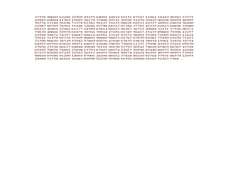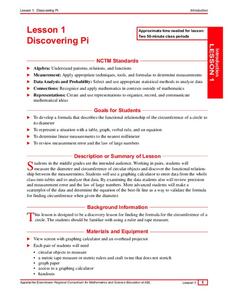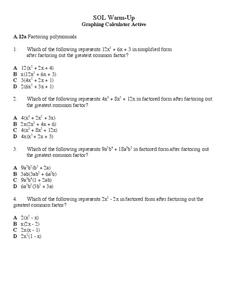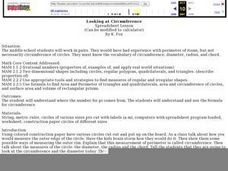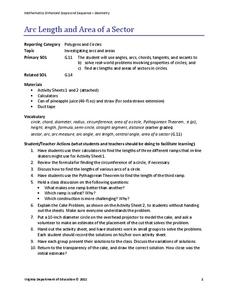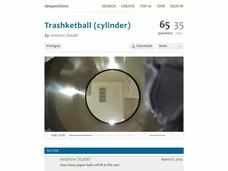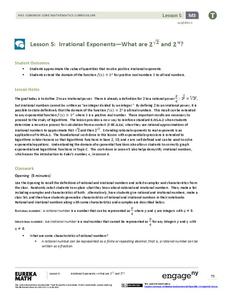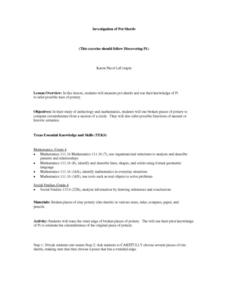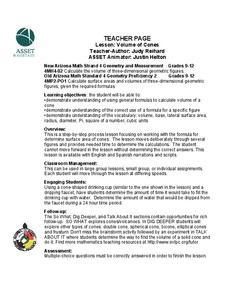Curated OER
Geometric Relatioships
Students explore measurements and geometric formulas. In this geometry lesson, students investigate pi as it relates to geometry. They collect data and use a chart to organize the data.
Curated OER
Circles Minilab
Young scholars learn how to measure the diameter and circumference of a circle. For this circle lesson, students organize their data to create a graph. Young scholars utilize their graph to make an inference about the slope of pi.
Curated OER
Lesson 2 Ordering Numbers
Math wizards begin the lesson by comparing and ordering rational numbers. Using a number line, they discover the relationship between the numbers and practice ordering them in the correct way. They also review proper techniques for...
Curated OER
An Introduction to Pi and the Area of a Circle
Young scholars explore measurements of a circle. In this lesson about circumference and radius, students practice calculating measurements of a circle. Young scholars estimate, calculate, and practice with graphing all while learning...
Curated OER
Perimeter and Area
Learners review concepts of area and perimeter, find area and perimeter of circles, practice calculating circumferences with a calculator, and calculate area using pi button.
Curated OER
Discovering Pi
Students develop a formula that describes the functional relationship of the circumference of a circle to its diameter. Working with a partner, they measure the diameter and circumference of circular objects in order to discover the...
Curated OER
Can You Canula?
Students calculate the circumference of a circle. In this geometry lesson, students measure the diameter of a circle using micrometers or calipers. They investigate the relationship of the diameter to that of the value of Pi.
Curated OER
Small Angle Calculations
Students work with circles, angles and estimating angles in the night sky. In this circles and angles lesson, students practice measuring a degree using the circumference of a circle and apply the degree to determine a way to use their...
Raytheon
Geometry: Circles
In this geometric circumference worksheet, 8th graders calculate the circumference of each of the 18 circles. The remaining pages of the worksheet include formulas and lesson ideas on finding the circumference of circles.
CCSS Math Activities
Smarter Balanced Sample Items: 8th Grade Math – Target I
A slideshow covering the Smarter Balanced Target I on solving problems involving volume of cylinders, cones, and spheres contains five sample items. Items range from finding the volume of a figure to finding the altitude of a cone given...
Curated OER
Reference Angles
Learn how to measure the reference angles in degrees and radians. Young scholars find reference angles that are coterminal with a given angle.
Curated OER
Factoring Polynomials
In this factoring polynomials worksheet, 9th graders solve and complete 33 different multiple choice problems. First, they determine the equation that best represents a simplified form after factoring out the GCF. Then, students...
Curated OER
Looking at Circumference
Students understand where the number for pi comes from. They understand and use the formula for circumference. Students measure the circles given out and the diameters of those circles and record the results on their worksheet.
Curated OER
Systems of Linear Equations
Introduce the inverse matrix method to solve systems of linear equations both algebraically and graphically. Using given data, your class checks their answers with graphing calculators. Handouts are included in this well-thought out...
Virginia Department of Education
Arc Length and Area of a Sector
What do skateboarding and baked goods have in common with math? You can use them to connect half-pipe ramps and cakes to arcs and sectors. Pupils compare the lengths of three different ramp options of a skate park. They calculate the...
101 Questions
Trashketball
Take a shot using a lesson on volume! Young learners watch a video showing a trashcan filling with paper balls. The task is to calculate the number of paper balls that will fit in the can. Pupils use volume calculations to make a...
EngageNY
Irrational Exponents—What are 2^√2 and 2^π?
Extend the concept of exponents to irrational numbers. In the fifth installment of a 35-part module, individuals use calculators and rational exponents to estimate the values of 2^(sqrt(2)) and 2^(pi). The final goal is to show that the...
Charleston School District
Comparing and Ordering Irrational Numbers on a Number Line
Estimating the value of numbers is much harder than it sounds! Scholars compare and order the value of numbers presented in different forms including fractions, decimals, roots, integers, and pi. This builds on the previous lessons in...
Curated OER
Investigation of Pot Sherds
Fourth graders review their prior knowledge on the concept of pi. Using broken pieces of pottery, they calculate the circumference from a section of the circle. In teams, they compete against one another to get the most accurate...
Curated OER
Perimeter, Circumference and Area
In this measurement learning exercise, students identify the area, perimeter and circumference of a diagram. They also find the size of a pond based on the diagram shown on the sheet. Finally, students calculate how much carpet is needed...
Curated OER
Geometry: Calculating Volumes
For this volume worksheet, students find the volume of 6 prisms/cylinders. Students use a picture and given measurements of the prisms/cylinders to find the volume.
Curated OER
Annual Wetland Plant Diversity Survey
Learners locate an area of marsh and, by measuring the total number of individual plants in a sample area, determine whether purple loosestrife population density is correlated to the total plant diversity of the community. They...
Illustrative Mathematics
Comparing Rational and Irrational Number
Algebra learners must know how to use rational numbers to approximate irrationals. This resource asks participants to decide which number is larger without using a calculator. It makes a great exercise to use as a five-minute transition...
Curated OER
Volume of Cones
Students identify the volume of cones and pyramids. In this geometry lesson, students derive the formula for cones and pyramids. They calculate the volume of cones and other three dimensional shapes.


